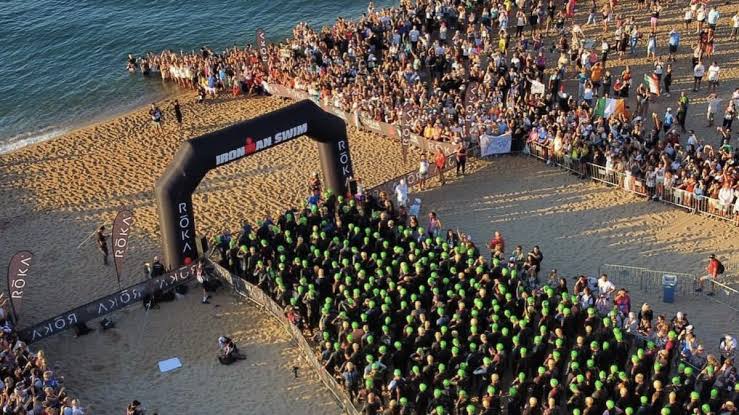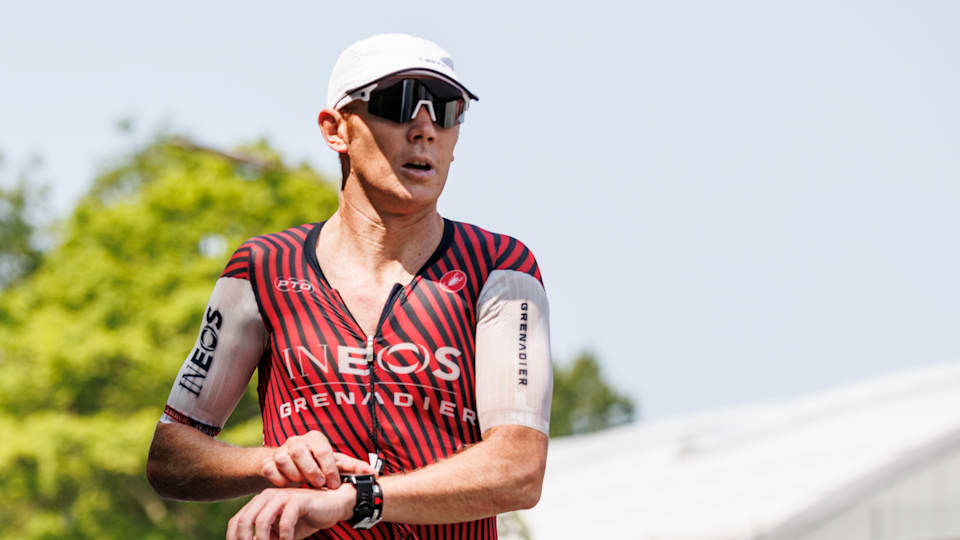Other Teams
Watch: Discover how to train for an Ironman

Watch: Discover how to train for an Ironman


Ironman training plan: How many disciplines and how many hours a day?
After a long career spanning from Olympic rowing to road cycling, Cameron Wurf has been a professional athlete in Ironman triathlon for seven years now, winning four events of the series (Wales 2017, Australia 2019, Italy 2019, Copenhagen 2021).
The 40-year-old Tasmania native admits he trains at least two disciplines every day.
Scroll down to watch
“I train between six and eight hours, so every day I have plenty to keep me entertained,” he said.
Swimming usually takes one to one and a half hours, while his running sessions last between two and three hours. His cycling practices vary from four to six hours.
“I generally don’t get on the bike for anything less than four hours,” he said.
“After swimming, I kind of feel like I want to go and have a nap, so I try to put on my cycling gear as quickly as possible and get out the door; otherwise, I want to take a nap!”

(Jan Hetfleisch/Getty Images for IRONMAN)
The daily Ironman training diet
“I burn about six or seven thousand calories on most days, so I guess I eat about the same amount. However, when I’m training, I don’t have any restrictions on my diet; it’s just whatever I need to get through the day,” says Wurf, who explained how his wife Fallon, pursuing a master’s degree in holistic nutrition, oversees his diet, ensuring he consumes only organic and fresh food prepared by her.
For breakfast, the Australian usually opts for something ‘basic’: oats with almond or rice milk and maple syrup. Sometimes, if the opportunity arises and to add ‘a bit of protein,’ he’ll have a couple of eggs.

As for his meals, it really depends on his training schedule for the following day:
“Today I had a very hard track session in the morning with some threshold work where you need a lot of energy so we had fish and rice, so a lot of carbs,” he told us in May while he was training to qualify for this year’s World Championships in Nice.
Video
“Tomorrow I have got more of a fat-burning ride, so I’m happy with just some proteins, usually fish, and maybe some vegetables. So I don’t necessarily need any carbs for dinner.”

(Sandra Mu/Getty Images)
Ironman nutrition plan for training and recovery
“I read Andre Agassi‘s book, and I think he summed it up the best: you’ve got to fuel the dragon,” Wurf said, emphasizing the importance of fuelling yourself when you train all day.
Smoothies with proteins, sometimes with the addition of “a healthy scoop of (organic) nutella,” chopped bananas on bread drizzld with honey, and a baguette spread with jam and peanut butter – these are some of the favourite foods that the veteran enjoys in the morning and between training sessions.
“I don’t measure it; I just consume what I can. I have a very instinctive feel for the fuel I need during the day,” he added.
His favorite guilty pleasure is a slice of carrot cake: “If I do stop at a café at the end of a ride, I order it every single time, even if I’m not hungry. I prefer to do some more exercise to burn off that carrot cake. I’d never eat anything that I’m not prepared to burn off; that’s sort of my theory.”
Ironman: Getting the maximum energy from food
“When I’m training, I train like I race; that’s one thing I learned from Chris Froome,” Wurf revealed.
The INEOS Grenadiers athlete explained how gels, caffeine, and sugary drinks are important to support him both in training and competition.
“Getting as much in as you possibly can allow you to train as hard as possible. The more energy you can store, the more it helps with the recovery process,” he added.
A ‘game-changer’ in endurance training came from the use of ketone supplements, which serve as an alternative source of energy alongside carbohydrates.
“That’s another big technological advancement as far as nutrition goes, and I think in the next few years, that will become much more mainstream,” he explained.
“Being able to better utilise the fuel that I do put in my body, which, you know, ketosis does, that’s huge.
“The food that you do take, just because you eat it, it doesn’t mean that that’s the energy you get. Often you don’t know how much you actually get from that. But, you know, with ketosis, it just allows you to utilise the fuel you do have much better.”

(Nigel Roddis Getty Images)
Ironman training: The importance of sleep
Sleep plays a crucial role in Ironman training by facilitating proper physical recovery.
“When you get 8 hours of sleep, you actually get 8 hours of really good sleep; that’s when all the gains are made,” the 2004 Olympian explained.
Wurf incorporates power naps into his routine two or three days a week, depending on his training schedule. He has invested in a mattress topper connected to his Wi-Fi that can automatically adjust the temperature to enhance the quality of his sleep.
“It’s quite an extravagant piece of equipment, but we’ve found it’s incredible,” he revealed.
On top of being a professional cyclist and triathlete, the Australian is also the father of a three-year-old son.
Balancing high-level training and parenting is “certainly a juggle,” but time efficiency and adequate sleep are part of his winning formula:
“I guess my secret is try to get to bed as early as you can. The earlier you can start the day, the more you can fit into it.”
Add these to your favourites

-

 Liverpool1 year ago
Liverpool1 year agoJubilation as English FA reversed back MANCHESTER UNITED late winning goal against Liverpool yesterday – all 3 points awarded to United
-

 Arsenal1 year ago
Arsenal1 year agoJubilation as English FA conclude appel on Arsenal dissalowed goal against Aston Villa and Arsenal rewarded 3 points – Mikel Arteta thank FA for their decision
-

 Manchester United1 year ago
Manchester United1 year agoBREAKING NEWS: Manchester City sack PEP GUARDIOLA this morning after winning just one match out of his last six matches
-

 Manchester United1 year ago
Manchester United1 year agoCONFIRMED: Due to many VAR-related issues, the English FA has cancelled yesterday’s Manchester United vs. Bournemouth match. A new date for the match has been scheduled. Eric Ten Hag beaming
-

 Manchester City12 months ago
Manchester City12 months agoManchester City move to Fourth place on EPL table at Everton after coming from behind to get the victory.
-

 Liverpool1 year ago
Liverpool1 year agoLiverpool Signings for the January transfer window 2024 have been confirmed.
-

 Manchester United1 year ago
Manchester United1 year agoTears as Eric Ten Hag left MANCHESTER UNITED in shame – Ten Hag’s first press conference after been sacked today as he insults Man Utd board
-

 Manchester United1 year ago
Manchester United1 year agoWayne Rooney said he would coach Manchester United because of…
